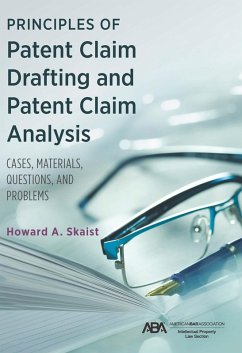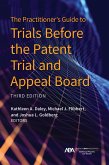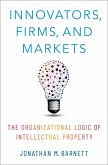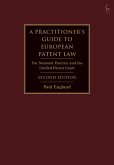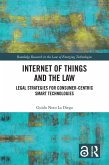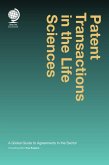Howard Skaist
Principles of Patent Claim Drafting and Patent Claim Analysis (eBook, ePUB)
Cases, Material, Questions, and Problems
95,95 €
95,95 €
inkl. MwSt.
Erscheint vor. 17.06.25

48 °P sammeln
95,95 €
Als Download kaufen

95,95 €
inkl. MwSt.
Erscheint vor. 17.06.25

48 °P sammeln
Jetzt verschenken
Alle Infos zum eBook verschenken
95,95 €
inkl. MwSt.
Erscheint vor. 17.06.25
Alle Infos zum eBook verschenken

48 °P sammeln
Unser Service für Vorbesteller - Ihr Vorteil ohne Risiko:
Sollten wir den Preis dieses Artikels vor dem Erscheinungsdatum senken, werden wir Ihnen den Artikel bei der Auslieferung automatisch zum günstigeren Preis berechnen.
Sollten wir den Preis dieses Artikels vor dem Erscheinungsdatum senken, werden wir Ihnen den Artikel bei der Auslieferung automatisch zum günstigeren Preis berechnen.
Howard Skaist
Principles of Patent Claim Drafting and Patent Claim Analysis (eBook, ePUB)
Cases, Material, Questions, and Problems
- Format: ePub
- Merkliste
- Auf die Merkliste
- Bewerten Bewerten
- Teilen
- Produkt teilen
- Produkterinnerung
- Produkterinnerung

Bitte loggen Sie sich zunächst in Ihr Kundenkonto ein oder registrieren Sie sich bei
bücher.de, um das eBook-Abo tolino select nutzen zu können.
Hier können Sie sich einloggen
Hier können Sie sich einloggen
Sie sind bereits eingeloggt. Klicken Sie auf 2. tolino select Abo, um fortzufahren.

Bitte loggen Sie sich zunächst in Ihr Kundenkonto ein oder registrieren Sie sich bei bücher.de, um das eBook-Abo tolino select nutzen zu können.
This casebook addresses key doctrines of patent law, but does so through teaching patent claim drafting principles, rather than the traditional approach to patent law. | It includes relevant statues, regulations and caselaw, along with questions, claim drafting examples, claim drafting problems, and discussion.
- Geräte: eReader
- mit Kopierschutz
- eBook Hilfe
- Größe: 7.28MB
Andere Kunden interessierten sich auch für
![The Practitioner's Guide to Trials Before the Patent Trial and Appeal Board, Third Edition (eBook, ePUB) The Practitioner's Guide to Trials Before the Patent Trial and Appeal Board, Third Edition (eBook, ePUB)]() The Practitioner's Guide to Trials Before the Patent Trial and Appeal Board, Third Edition (eBook, ePUB)102,95 €
The Practitioner's Guide to Trials Before the Patent Trial and Appeal Board, Third Edition (eBook, ePUB)102,95 €![Innovators, Firms, and Markets (eBook, ePUB) Innovators, Firms, and Markets (eBook, ePUB)]() Jonathan M. BarnettInnovators, Firms, and Markets (eBook, ePUB)27,95 €
Jonathan M. BarnettInnovators, Firms, and Markets (eBook, ePUB)27,95 €![Contemporary Issues in Intellectual Property Law in Africa (eBook, ePUB) Contemporary Issues in Intellectual Property Law in Africa (eBook, ePUB)]() Contemporary Issues in Intellectual Property Law in Africa (eBook, ePUB)42,95 €
Contemporary Issues in Intellectual Property Law in Africa (eBook, ePUB)42,95 €![A Practitioner's Guide to European Patent Law (eBook, ePUB) A Practitioner's Guide to European Patent Law (eBook, ePUB)]() Paul EnglandA Practitioner's Guide to European Patent Law (eBook, ePUB)168,95 €
Paul EnglandA Practitioner's Guide to European Patent Law (eBook, ePUB)168,95 €![European Union Plant Variety Protection (eBook, ePUB) European Union Plant Variety Protection (eBook, ePUB)]() Gert WürtenbergerEuropean Union Plant Variety Protection (eBook, ePUB)131,95 €
Gert WürtenbergerEuropean Union Plant Variety Protection (eBook, ePUB)131,95 €![Internet of Things and the Law (eBook, ePUB) Internet of Things and the Law (eBook, ePUB)]() Guido Noto La DiegaInternet of Things and the Law (eBook, ePUB)0,00 €
Guido Noto La DiegaInternet of Things and the Law (eBook, ePUB)0,00 €![Patent Transactions in the Life Sciences (eBook, ePUB) Patent Transactions in the Life Sciences (eBook, ePUB)]() Patent Transactions in the Life Sciences (eBook, ePUB)183,95 €
Patent Transactions in the Life Sciences (eBook, ePUB)183,95 €-
-
-
- This casebook addresses key doctrines of patent law, but does so through teaching patent claim drafting principles, rather than the traditional approach to patent law.
- It includes relevant statues, regulations and caselaw, along with questions, claim drafting examples, claim drafting problems, and discussion.
Dieser Download kann aus rechtlichen Gründen nur mit Rechnungsadresse in A, D ausgeliefert werden.
Produktdetails
- Produktdetails
- Verlag: American Bar Association
- Seitenzahl: 816
- Erscheinungstermin: 17. Juni 2025
- Englisch
- ISBN-13: 9781639055296
- Artikelnr.: 72262677
- Verlag: American Bar Association
- Seitenzahl: 816
- Erscheinungstermin: 17. Juni 2025
- Englisch
- ISBN-13: 9781639055296
- Artikelnr.: 72262677
- Herstellerkennzeichnung Die Herstellerinformationen sind derzeit nicht verfügbar.
Howard graduated Summa Cum Laude, Phi Beta Kappa, and Tau Beta Pi from Princeton University (Princeton, NJ) in 1982 with a B.S.E.E. Degree in Electric Engineering and Computer Science. He entered Duke University (Durham, NC) in 1984, simultaneously pursuing a Master's Degree in Business Administration at the Fuqua School of Business and a Juris Doctorate Degree at Duke Law School. While at Duke, he served on the Editorial Board of the Duke Law Journal. He graduated with highest honors, Order of the Coif honors, and won the Willis Smith Award for being first in his law school class.
Immediately after graduating from Duke, he began clerking for Judge Eugene Wright on the Ninth Circuit Court of Appeals in Seattle, WA. A year later, he entered private practice as a member of the Oregon bar, joining Stoel, Rives, a Pacific Northwest law firm headquartered in Portland. After spending two years in the Patent Group at Stoel, Mr. Skaist became an in-house patent attorney for General Electric Co. at its Corporate Research and Development Center outside Albany, New York. Eventually, he joined AT&T's Bell Laboratories as an intellectual property attorney, prior to the formation of Lucent Technologies. He returned to the Pacific Northwest in 1996 rose to become Intel's Director of Patents.
In 2003, Mr. Skaist left Intel and founded Berkeley Law & Technology Group, (BLTG). Currently, BLTG has a total of twelve patent lawyers. BLTG handles all aspects of patent law practice, including: patent preparation and prosecution, patent strategy, portfolio building, and portfolio management, patent assertion and other patent license negotiation support, preparing patent opinion letters, and strategic oversight of patent litigation. Mr. Skaist was also an adjunct professor at the Berkeley School of Law (formerly, Boalt Hall) in Berkeley, CA, and at Willamette School of Law in Salem, OR, and has also taught patent law, copyright law, and computer law at Lewis and Clark Law School and Albany Law School. In addition, he is a member of the AIPLA and served for several years (1998-2001) on the Editorial Board of the AIPLA Quarterly Journal.
Immediately after graduating from Duke, he began clerking for Judge Eugene Wright on the Ninth Circuit Court of Appeals in Seattle, WA. A year later, he entered private practice as a member of the Oregon bar, joining Stoel, Rives, a Pacific Northwest law firm headquartered in Portland. After spending two years in the Patent Group at Stoel, Mr. Skaist became an in-house patent attorney for General Electric Co. at its Corporate Research and Development Center outside Albany, New York. Eventually, he joined AT&T's Bell Laboratories as an intellectual property attorney, prior to the formation of Lucent Technologies. He returned to the Pacific Northwest in 1996 rose to become Intel's Director of Patents.
In 2003, Mr. Skaist left Intel and founded Berkeley Law & Technology Group, (BLTG). Currently, BLTG has a total of twelve patent lawyers. BLTG handles all aspects of patent law practice, including: patent preparation and prosecution, patent strategy, portfolio building, and portfolio management, patent assertion and other patent license negotiation support, preparing patent opinion letters, and strategic oversight of patent litigation. Mr. Skaist was also an adjunct professor at the Berkeley School of Law (formerly, Boalt Hall) in Berkeley, CA, and at Willamette School of Law in Salem, OR, and has also taught patent law, copyright law, and computer law at Lewis and Clark Law School and Albany Law School. In addition, he is a member of the AIPLA and served for several years (1998-2001) on the Editorial Board of the AIPLA Quarterly Journal.
